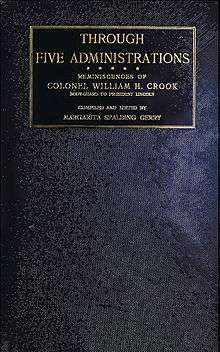William H. Crook

William H. Crook (October 15, 1839 – March 13, 1915[1]) was one of President Abraham Lincoln's bodyguards in 1865.[1][2] After Lincoln's assassination (while Crook was off duty), he continued to work in the White House for a total of over 50 years, serving 12 presidents.[1][3]
Even during the height of the American Civil War, presidential security was lax. Throngs of people entered the White House every day. "The entrance doors and all the doors on the Pennsylvania side of the mansion were open at all hours of the day and, often, very late into the evening."[4] Lincoln finally gave in to concerns for his safety in November 1864, and was assigned four around-the-clock bodyguards.[5] When one was reassigned as the White House doorkeeper, Crook, then a member of the Washington Police Force and a former Union Army soldier,[3] was selected as his replacement, beginning January 4, 1865.[5] Lincoln's son Tad had a speech impediment and referred to Crook as "Took".[6] When Crook was later drafted, he went to see the President, who arranged to keep his services.
On April 14, 1865, Crook began his shift at 8 a.m. He was to have been relieved by John Frederick Parker at 4 p.m., but Parker was several hours late. Lincoln had told Crook that he had been having dreams of himself being assassinated for three straight nights. Crook tried to persuade the President not to attend a performance of the play Our American Cousin at Ford's Theater that night, or at least allow him to go along as an extra bodyguard, but Lincoln said he had promised his wife they would go. As Lincoln left for the theater, he turned to Crook and said "Goodbye, Crook." Before, Lincoln had always said, "Good night, Crook." Crook later recalled: "It was the first time that he neglected to say ‘Good Night’ to me and it was the only time that he ever said ‘Good-bye’. I thought of it at that moment and, a few hours later, when the news flashed over Washington that he had been shot, his last words were so burned into my being that they can never be forgotten."[2][5][7] Crook blamed Parker,[2] who had left his post at the theater without permission.
Crook also served as a bodyguard for Lincoln's successor, Andrew Johnson. It was he who brought the news to the embattled President that he had been acquitted in his impeachment trial in May 1868.[8]
When good friend Ulysses S. Grant became President, he appointed Crook "Executive Clerk of the President of the United States" in 1870, and dispersing agent in 1877, the latter the position he would hold for the rest of his career.[1][3][9] On January 5, 1915, President Woodrow Wilson and the members of the White House staff celebrated his 50 years of service and presented him with a cane.[1]

Crook set his memoirs down on paper in the book Through Five Administrations: Reminiscences of Colonel William H. Crook, Body-Guard to President Lincoln, compiled and edited by Margarita Spalding Gerry. There are actually six covered, from Lincoln to Chester A. Arthur, though James A. Garfield and Arthur are covered in a single chapter.
William H. Crook died at his boarding house after being sick with pneumonia for more than a week.[1] He was predeceased by his wife, Jane Catherine Rodbird (1846-1895).[10] He was buried at Arlington National Cemetery; President Wilson attended the funeral.[1]
References
- 1 2 3 4 5 6 7 "William H. Crook". Arlington National Cemetery. Retrieved October 9, 2013.
- 1 2 3 "William Crook". PBS. Retrieved October 9, 2013.
- 1 2 3 "Col. W. H. Crook Dead.". The New York Times. March 13, 1915.
- ↑ Rietveld, Ronald D. (Summer 1999). "The Lincoln White House Community". Journal of the Abraham Lincoln Association. 20 (2).
- 1 2 3 Reck, Waldo Emerson (1987). A. Lincoln, His Last 24 Hours. McFarland. pp. 54–55. ISBN 9780899502168. Retrieved October 9, 2013.
- ↑ Hutchinson, John M. (Winter 2009). "What Was Tad Lincoln's Speech Problem?". Journal of the Abraham Lincoln Association. 30 (1).
- ↑ Lloyd Lewis (1994). The Assassination of Lincoln: History and Myth. University of Nebraska Press. p. 297. ISBN 9780803279490.
- ↑ Boller, Paul F. Jr. (1989). Presidential Wives: An Anecdotal History. Oxford University Press. p. 128. ISBN 9780199772292.
- ↑ http://clinton4.nara.gov/WH/kids/inside/html/fall99/html/saunders.html
- ↑ William H. Crook at Find a Grave
External links
- Full text of Through Five Administrations: Reminiscences of Colonel William H. Crook, Body-Guard to President Lincoln, now out of copyright